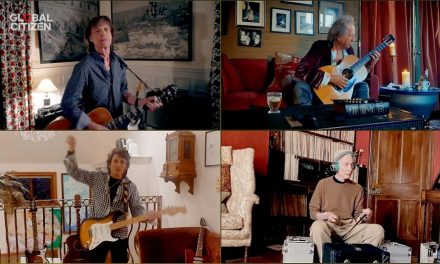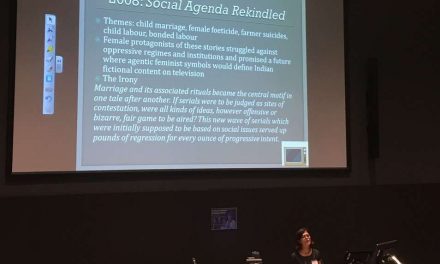‘Television is not dead’ was one of the opening statements of John T. Caldwell at the biennial ECREA Television Section conference Redefining Televisuality: Programmes, Practices, Methods. The conference took place from the 25th to the 27th October 2023 at the Film University Babelsberg in Germany. Experts from all over the world traveled to Babelsberg to discuss the overall topic of change in television. One of the main topics of the conference was the question of how we can redefine television. John T. Caldwell from the University of California, who was one of the keynote speakers, analyses the properties of television in his theory of ‘televisuality’ (Caldwell, 1995). He also examines power relations in the industry and tries to comprehend how they can affect creative work. Thus, he tries to understand something that we all want to know: How does this system work and how is it monetised? It was possible to participate in different panels and discuss interesting topics with the experts. I got to be a part of the Sport, Liveness & Style panel that occurred on the second day of the conference.
Moderated by Michael Wedel from the Film University, the panel was opened by Markus Stauff, from the University of Amsterdam. He introduced a perspective that has not been in focus in Caldwell’s approach to ‘televisuality’ (1995): the “’televisuality’ of Sports TV. Due to the fact that Sports TV is approached as a mere spectacle, I personally have never thought it to be more than that, even though it is a long lasting and persisting element of television. Stauff argues that Sports TV is reluctant for redefining televisuality since its performance is ‘essential for the folding of cross-media practices.’ The question that arose within me was: why are we predominantly exposed to the sensational aspects of sports? This definitely gave me something to think about.
The second presenter, Danilo Callea, wanted to understand how live sporting events influence the idea of liveness. He described the concept of liveness as a platform that forms a connection among different infrastructures. He explored how the concept of liveness in sports broadcasts is currently being influenced by the rise of online streaming platforms. Callea characterised a field of tension between live sporting events and their streaming coverage. The broadcasting of sports TV presents new infrastructural challenges and interactive forms of engagement for the audience. Nevertheless, the consumption of sports content continues to foster social connections among individuals, thereby reflecting one of the classical purposes of television. Thus, traditional television still has an impact on the sports experience and social connections among individuals. Callea’s talk underlines the persisting importance of television. The concept of ‘televisuality’ (Caldwell, 1995) and the TV itself still have a significant influence on sport events as media events.
Another way to redefine television is proposed by a study of Florian Groß, who is currently finishing his Ph.D. thesis at the Leibniz University of Hanover. Groß considers Caldwell’s ‘televisuality’ (1995) as authentic and builds his theory upon it. He just wants to add another element to it that is essential for US-television: seriality. Essentially, teleseriality means that a plot is developed over several episodes, with each episode building on the previous one and an ending with a cliffhanger or unresolved situation that encourages viewers to watch the next episode to find out what happens next in the story. But Groß sees more than a mere strategy to get the recipients in front of their TV, he wants to analyse the narrative dynamics and he wants to know how newer streaming shows complement strong stylisation with serial innovation. He found that this is more than a mere business strategy. The teleseriality represents a new expression of the (serial) form and narrative dynamics of American television. After listening to this presentation, that I could personally relate to (because of binge watching), there was just one speaker left.
Thematically slightly different, but nevertheless highly captivating was the presentation by Consuelo Ábalos who is currently in her second year of the Doctoral Program at Pontificie Universidad Católica de Chile. She conducted a study of the Netflix fiction series: 42 Days of Darkness.
As the first Chilean Netflix production it was surprising to see that it contains elements of Nordic Noir, even though it was produced in a country where the television market is dominated by telenovelas. Nordic Noir includes melancholic elements, emotionally complex characters, particular use of Nordic settings and powerful women (in contrast with the usual style of Latin American melodrama). For me this is something you don’t think about that much as a viewer. Talking about it made me realise that the series does not even seem like it was shot in Chile. It is mostly dark, rainy and dreary. Netflix successfully combined the traditional genre of Latin America with the use of Nordic Noir, which has been widely embraced in the global marketplace.
At the end of this panel, I felt enriched through the studies and thoughts of the experts, especially in regard to Sports TV as it offered me a new perspective. The panel overall also gave me an understanding of a series from a different point of view. Normally I would not have thought about the mixture of styles, I would have guessed that a different portrayal of a country was just for reasons of storytelling. I felt confused because there was so much information in such a short period of time that I did not have enough time to think a topic through before a new one had already started. And I felt lost in my thoughts because the conference gave me some very interesting insights into television and presented new ways of thinking. Even whilst studying in this field you tend not to think about every detail. Coming from a generation that grew up with streaming and television, it is very interesting to learn new ways to conceive television. I learned that we can’t just apply Caldwell’s concepts to every television programme, since there are topics, like sports TV, that require considerations such as liveness and the continuity of style. But we can use and adapt his concepts so that they will contribute to new findings in these fields.
As Caldwell says: we can explore the new possibilities of television and we can learn to redefine it. This conference provides insights into the intricate workings of this complex system and affirms that television is far from dead.
Viviane Winkler (22 years) holds a BA degree in Media Management from the University of Music, Theatre and Media in Hanover and is currently pursuing an MA in Media Studies at the Film University Babelsberg. In addition to her academic work, she gained valuable experience through an internship at the local television channel RTL Nord in Hanover. She has a strong passion for various forms of film and television content and is enthusiastic about contributing to such projects in the future.





